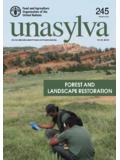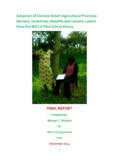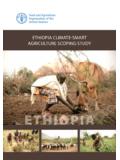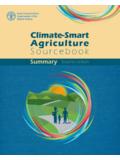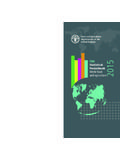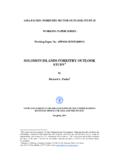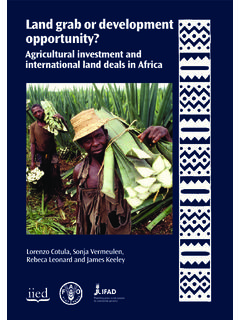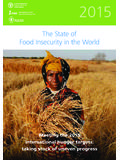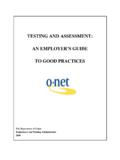Transcription of t h E S t a t E O F F O O D a n D a G r I C U L t U r E …
1 46 TH E S TAT E O F F O O D AN D A G R I C u l t u R E 2 0 1 0 1 1. 5. Closing the gender gap in agriculture and rural employment Closing the gender gap in agriculture is them. In the parts of sub-Saharan Africa not an easy task, but progress can be made where customary property regimes prevail, and simple interventions can sometimes community leaders tend to favour males over be very powerful. Carefully designed females in the allocation of land, both in policies, strategies and projects can work terms of quantity and quality. Where private within existing cultural norms, through property prevails, cultural norms generally the public and private sectors, in ways that dictate that men own and inherit land while benefit both women and men (Box 9). women gain access to land through their Specific recommendations for closing the relationship with a male relative. gender gap in access to land, rural labour markets, financial services, social capital and Eliminate discrimination under the law technology include the steps outlined below.
2 Where statutory legal rights to land remain gender-biased, a key strategy is to review and reform all national legislation that Closing the gap in access to land17 relates to land and natural resources. Although land laws are the starting point, Governments have long recognized the related legislation should also be considered. importance of secure land tenure in Family and marriage laws, inheritance promoting equitable, sustainable agricultural provisions and housing law are all important development. Women have not always legal areas that play a supporting role in benefited from general land distribution and ensuring equitable treatment of men and titling efforts, however, and in some cases women in control over have seen their customary rights eroded as formal rights have been extended to male Recognize the importance and power of heads of household. Many governments have customary land rights attempted to strengthen women's tenure Many countries have extended formal legal rights within marriage and as individuals, rights to women over land inheritance and but these efforts are often frustrated by a ownership, but customary practices and combination of legal and cultural practices the inability of many women to assert that still favour men.
3 Their legal rights mean that formal legal In Latin America, for example, inheritance provisions are often not followed. In many is the most frequent source of transfer of countries, tradition is stronger than law ownership of land, but daughters are much when it comes to land issues. Opposition less likely than sons to inherit land. Many from land reform authorities, peasant unions, countries in the region have instituted legal village authorities and male household reforms that have strengthened married heads can frustrate land reform efforts to women's land rights, but land-titling efforts extend legal land rights to both single and have not always facilitated the practice of married women. Legal rights are difficult to including both husbands' and wives' names. enforce if they are not seen as legitimate;. In Asia, women typically have legal rights to thus recognizing customary land rights and land ownership, but often struggle to assert working with community leaders is essential to ensure that women's rights are protected.
4 17. This section is based on FAO (2010h), which provides an extensive review of the relevant literature. Important studies in this field include Agarwal (1994), Agarwal (2003), 18. Additional information on women and their status under Lastarria-Cornhiel (1997), Deere (2003), Deere and Le n the law is available at the World Bank website Women, (2003), and Deere and Doss (2006). business and the law ( ). W O M E N I N A G R I C u l t u R E : C losi n g t h e ge n de r g a p fo r de v elop m e n t 47. BOX 9. Mama Lus Frut: working together for change Palm oil production in Papua New Guinea collection to take into account women's is dominated by smallholder farmers, time constraints. Then they distributed and harvesting oil palm trees is highly special nets that made it easier to carry differentiated by gender: men cut fresh the loose fruits to the roadside. Neither fruit bunches from the trees, while women initiative was successful, because they did collect loose fruits from the ground and not correctly assess why women were not carry them to the roadside where they collecting the fruit.
5 Are picked up by operators from the mill. Finally, the Mama Lus Frut scheme These gender roles are firmly engrained in was introduced in 1997 to ensure that the local culture and institutions. women received payment for their work. Family labour is mobilized for the Women received individual harvest nets harvest. While it was implicitly assumed and harvest payment cards, and they in the past that the household head received their own monthly income would compensate family members for based on the weight of the fruit they their labour with the income gained from collected, deposited directly into their oil palm production, in reality, female personal bank accounts. As a result, the household members were often not being number of women participating in the compensated for their work. In many cases, scheme more than doubled and the this led to intra-household struggles and amount of loose fruits delivered to the to women withdrawing their labour from mills increased significantly.
6 By 2001, loose fruit collection and focusing instead 26 percent of smallholder income from on vegetable production, which allowed oil palm was directly paid to women. Men them to earn, and keep, an income. reacted positively because the gender The local oil palm industry realized that division of labour remained unchanged between 60 and 70 percent of loose fruit and intra-household conflicts over palm oil were not being collected. The industry harvesting decreased. tried to raise the share of loose fruits in total harvest through several initiatives. Sources: Kosczberski, 2001, and Warner and First, they delayed the timing of loose fruit Bauer, 2002. Indeed, strengthening traditional use-rights and courts. Gender-balanced employment for widows and divorced women may provide in these institutions can also help. Where more secure tenure for them even in cases appropriate, officials' performance should where there is resistance to full ownership.
7 Be evaluated against gender-related targets. The involvement of women's organizations in Educate officials and evaluate them on the process can facilitate the achievement of gender targets gender equity targets. Furthermore, gender Local land officials may be unaware of targets for access and tenure security should gender equity laws and objectives or lack be monitored and officials held accountable the mechanisms, tools and will to implement for meeting them. them. Legislation needs to be supported In Nicaragua the property legalization by regulations and gender-specific rules process, which the women's affairs office and guidelines that educate officials in helped coordinate, included gender agriculture ministries, land institutions and sensitization training for officials and other agencies regarding the implementation information campaigns on the inclusion of of the gender position of the law. Relevant women in the process (FAO, 2010h).
8 This training is also required for staff in the has helped raise awareness and acceptance various institutions that carry out and enforce among men and women of women's land land rights, including land registries, cadastral rights, although several rounds of training offices, titling agencies, land magistrates were necessary. 48 TH E S TAT E O F F O O D AN D A G R I C u l t u R E 2 0 1 0 1 1. Educate women regarding land rights of women in local government. The 2003. Raising women's legal literacy, increasing constitution mandates that 30 percent of all the dissemination and accessibility of decision-making representatives be women. information and establishing supporting Similarly, in the United Republic of legal services are essential in promoting Tanzania, village land councils, which settle gender equity in land programmes. Legal land disputes, comprise seven members, of literacy means that women are aware of whom three must be female (Ikdahl, 2008).
9 Their legal rights and know how they can be Ethiopia's land certification process has enforced and protected. Officials responsible been hailed as effective, low-cost, rapid and for implementing land programmes must transparent, and gender equity goals have actively educate both men and women been advanced because land administration regarding gender equity provisions and committees at the local level are required to the possibility of joint titling, rather than have a least one female member. treating the decision as a private matter In the Lao People's Democratic Republic, between spouses (Ikdahl, 2008; Brown, 2003). women were not receiving titles until the Civil society organizations can be Lao Women's Union started to participate instrumental in promoting legal literacy. In in the land-titling programme. The Union Mozambique, when land legislation was works at the national and local levels and integrated into literacy programmes or when has been active in informing both men and non-governmental organizations (NGOs) women about the titling process and their distributed land law information repeatedly legal rights, as well as helping to formulate over a long time, women were more likely to gender-sensitive procedures and train local know their rights to land (FAO, 2010h).
10 Field staff in their application. Precisely because they are so important, Women must be an integral part of the land tenure issues are often contentious, and implementation of land programmes. women seeking to assert their rights may Training community members as paralegals, be subject to pressure from their families topographers and conflict mediators can and communities. The provision of legal help build community skills and increase the protections and affordable legal services probability that women's concerns will be are vital in this respect. Mobile legal clinics addressed. with staff trained in land issues may be a useful solution during land formalization Adjust bureaucratic procedures programmes. Simple steps such as making space for two names on land registration forms can Ensure that women's voices are heard be a powerful tool for encouraging joint Meaningful representation constitutes an titling and protecting the rights of women important step towards helping women within marriage.
